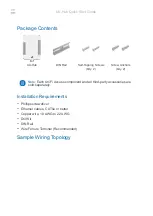
E5EX–H
E5EX–H
15
Precautions
Mounting
The dimensions of the Temperature Controller conform to DIN
43700. Recommended panel thickness is 1 to 8 mm.
Do not install the Temperature Controller in a location exposed to
excessive dust or corrosive gases. Moreover, avoid locations sub-
ject to heavy vibration or shock, water or oil spray, or high tempera-
tures. Isolate the Temperature Controller from equipment that gen-
erates strong, high-frequency noises such as high-frequency weld-
ers.
Attach the two mounting fixtures supplied with E5EX–AH on the top
and bottom of the Temperature Controller. Tighten the screws of the
mounting fixtures with your fingers.
Connection Examples
With Solderless Terminal:
Use M3.5 solderless terminals with the Temperature Controller’s
M3.5 self-rising pressure plate screws.
Solder-dipped Leads:
Strip 6 to 12 mm of the lead wires and carefully arrange the wire tips.
Do not tighten the terminal screw with excessive force. The terminal
block of the Temperature Controller is constructed so that the lead
wires can be connected to all the terminals from the same direction.
Top
Bottom
Temperature Sensor Connection
To reduce induced noise, the lead wires connecting the temperature
sensor to the Temperature Controller must be separated from pow-
er lines and load lines.
Use the specified compensating conductors for thermocouples.
When using a thermocouple as the temperature sensor, attach the
short-circuit bar shown in the terminal block diagram on the hous-
ing. Use lead wires having a small resistance for temperature resis-
tance thermometers.
Be sure to remove the short-circuit bar from the terminals when a
temperature resistance thermometer is used.
Sequenced Circuits
Several seconds are required until the relay is turned ON after pow-
er has been supplied to the Temperature Controller. Therefore, take
this time delay into consideration when designing sequenced cir-
cuits which incorporate a Temperature Controller.
Terminal Layout Diagram on the Housing
The Temperature Controller allows an input and output device to be
freely selected. Use the terminal layout diagram attached on the
housing of the Temperature Controller to identify the output device
mounted in the Temperature Controller, by making the diagram as
follows:
Check here with a felt-tip pen.
Stickers
Stickers indicating the temperature sensor type (R, S, K, J, etc.) and
Control Output Unit (R, S, and Q) are supplied with the Temperature
Controller. Attach these stickers on the front panel as shown, allow-
ing the temperature sensor and Control Output Unit mounted in the
Temperature Controller can be easily discerned.
Sticker identifying
Control Output Unit
Sticker identifying
temperature sensor


































